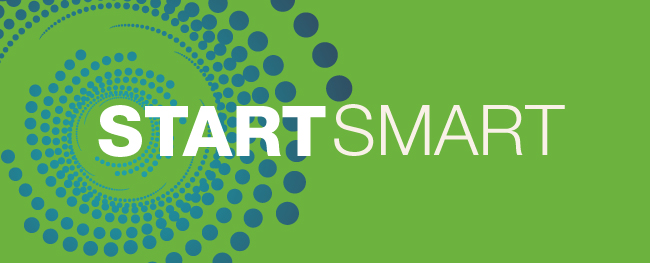
For many students, the transition to college can be challenging. Start Smart classes are designed to help students in this transition by addressing many of the common “new student” concerns and to ensure that students receive all the support they might need. Start Smart courses are taught by experienced faculty who care about new students and know exactly how to provide support AND inspire – at the same time.
Introduces students to skills fundamental to two-dimensional visual organization. Explores elements such as line, shape and color, and principles such as unity, balance and variation. Provides a foundation for all areas of art and design. Start Smart Program sections include exploration, discussion, and advising for transfer and careers in all areas of art and design.
Provides an overview of early childhood care and education, including the basic values, structure, organization and programming. Examination of the student’s personal qualities in relationship to expectations of the field. Directed observation in a variety of programs and settings. Fifteen (15) hours of observation required. (NOTE: The program’s health requirements must be completed prior to observation.)
Introduces engineering techniques, methods and history. Explores career options and requirements for various engineering fields. Covers interrelationships within and between engineering, technology and science to allow differentiation between various career choices.
Introduces fundamentals of electricity and magnetism. Covers basic electrical laws and principles. Presents electrical quantities, units, symbols and notation. Examines foundational electronic materials and components. Presents elementary DC (direct current) and AC (alternating current) network analysis, key semiconductor devices, and simple analog and digital circuits. Also covers electrical safety considerations, laboratory instrumentation and test and measurement techniques.
Provides an overview of fire protection; career opportunities in fire protection and related fields; philosophy and history of fire protection/service; fire loss analysis; organization and function of public and private fire protection services; fire departments as part of local government; laws and regulations affecting the fire service; fire service nomenclature; specific fire protection functions; basic fire chemistry and physics; fire protection systems; introduction to fire strategy and tactics.
Students will work on college skills that will help them be successful in all their classes while exploring majors and career paths that Harper has to offer. During this class, students will be encouraged to meet with their advisor and work together to create an Ed Plan. This ensures that students will get a degree or certificate on time. Click here to learn more.
Introduces vocabulary, concepts and scientific principles used in the refrigeration
and air conditioning industry. Studies theories on heat laws, pressures, matter, and
energy; examines refrigerant chemistry and the refrigeration cycle. Covers proper
refrigerant management techniques and safe practices. Emphasizes practical application,
troubleshooting techniques, measuring and testing the operation of the basic refrigeration
cycle; including working with ACR copper tubing, tools, and instruments. (formerly
RAC 101)
Prerequisite: Prior or concurrent enrollment in ELT 110 (Introductory Electronics) and MTH 097
(Basic Technical Mathematics) with grades of C or better, or consent of coordinator.
Introduces vocabulary, concepts and scientific principles used in the heating industry. Studies heat laws, heat transfer, and examines fundamentals of the combustion process. Covers gas, oil, and electric forced-air systems for residential comfort heating. Emphasizes practical application for testing and adjusting system performance, troubleshooting electrical systems and control, working with gas pipe, preventative maintenance, service and repair. (formerly RAC 103)
Provides a fundamental introduction to the academic content areas that make up the discipline of kinesiology, including: anatomy & physiology, exercise science, biomechanics, motor control & learning, psychology and sociology. Introduces the professional field of kinesiology and looks at career paths within the major such as: Rehabilitation, Sports Management, Personal Training, and Physical Education. This course assesses students' personal traits and professional skill sets, with emphasis on development for increased candidacy in academic and/or professional pursuits related to the field of kinesiology.
Introduces the nature of business and the environment in which it operates. Forms of business ownership, introduction to operative and facilitating facets of business operation, management, marketing, accounting, statistics, business law, finance, investments, insurance and labor-management relations.
NET101 provides an overview of the cybersecurity industry and the different careers and work roles in the field. Learn the major skills and knowledge required for cybersecurity professions and associate employment skills and knowledge sets to specific classes in the Harper College Cybersecurity AAS Degree and certificate programs. Covers issues facing the cybersecurity industry, cybersecurity professional organizations, and industry credentials. Includes cybersecurity workforce competencies, review of academic degrees, certificates, and credentials. Covers navigating the college environment, learning and academic strategies, and career development.
Surveys the functions of law; courts and lawyers in modern society; analysis of the origin, training and role of the paralegal; professional responsibilities of the lawyer; outline of the fields and specializations within the practice of law; and instruction in legal research and writing upon a review of the sources and works of law. Students must take the Paralegal Studies entrance examination.
Introduces Supply Chain Management (SCM) and the end-to-end (E2E) business processes necessary to achieve market and financial value, as well as competitive advantage. SCM is achieved by an organization proactively adopting initiatives to move suppliers and customers into collaborative relationships for mutual gain. Attention is focused on the fundamentals including customer service, fulfillment, demand planning and forecasting, inventory control, procurement, storeroom/warehousing, production control/operations, and physical distribution/logistics. All topics focus on technology, financial trends and career paths within the field.
Center for New Students and Orientation
Building C, Room C104
847.925.6208
Ask an Advisor
Hours
Monday - Thursday: 8:00 a.m. - 7:00 p.m.
Friday: 8:00 a.m. - 4:30 p.m.